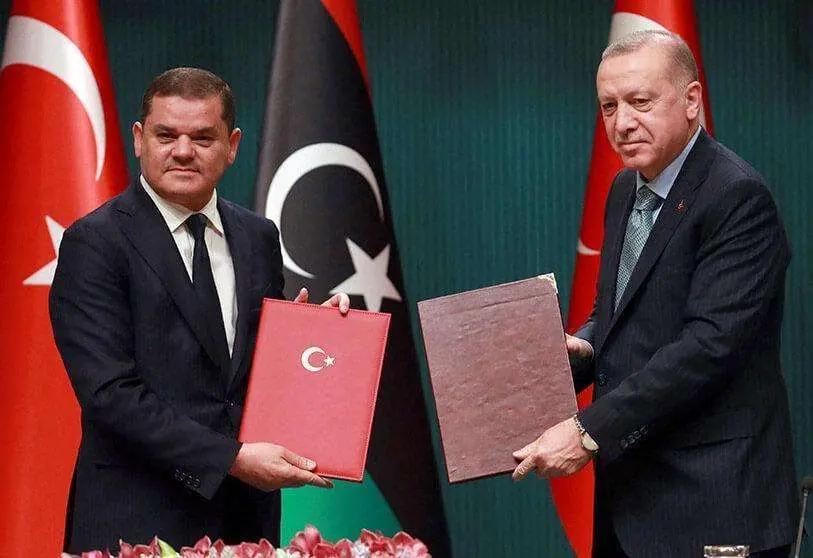Erdogan reassesses his support for Libyan Prime Minister Dbeibé

Recent negotiations between the Vice-President of the Libyan Presidential Council, Abdullah al-Lafi, the number two in Dbeibé's Turkish-backed, Muslim Brotherhood-linked executive, and the Speaker of the House of Representatives, Aguila Saleh, who is linked to Marshal Khalifa Haftar, have raised doubts about Turkish support for the National Unity Government. A government that, since the lack of consensus prevented elections from being held last February, has been contested by Fathi Bashagha and Abdul Hamid Dbeibé.
According to a French source close to the Libyan intelligence services, representatives of the two factions vying for control of Libya met in the Emirati city of Dubai for talks, although it is not yet known whether the aim of this meeting could be the creation of a new executive authority.
Since Dbeibé refused to step down as prime minister in February and the Tobruk parliament appointed Fathi Bashagha as interim leader of the government by a show of hands, Libya's already complicated political scene has become even more complicated, adding yet another new executive bicephaly. Now, preliminary leaks seem to point in the direction of the establishment of a presidential council that would presumably be headed by leader Aguila Saleh, with Vice-President Abdullah al-Lafi presiding over the new executive.

However, these moves have not pleased Erdogan, one of the main supporters of Dbeibé and the National Unity Government - as opposed to the parallel authority in the east. While some observers have claimed that the prime minister lost Turkish confidence after his attempts to negotiate with Haftar for the end of the Bashagha government, others argue that Ankara's support was already hanging by a thread last December 2021, when Dbeibé travelled to the eastern Libyan town of Ar Rajmah.
Although Marshal Khalifa Haftar's representatives were in favour of Dbeibé's leadership of a transitional executive, Turkish directives - which have interfered in relations with the Libyan army's general command - have provoked frontal opposition from Haftar's supporters towards the prime minister. This was accentuated by Dbeibé's refusal to allocate a budget line to the Libyan military.

In this scenario, Erdogan and his ministers have maintained seemingly contradictory positions on their support for Dbeibé. "Fathi Bashagha announced his candidacy, and our relations with Fathi Bashagha are good. But on the other hand, our relations are also good with Dbeibé," the Turkish president said in February. "What matters is who the Libyan people elect, and how.
While relations between Abdul Hamid Dbeibé - and his family - and Ankara are particularly good after the latest million-dollar deals, the ties between Bashagha and Erdogan are not negligible either. This is the man Haftar is closest to the Turkish government, and certainly the most likely to become an important face of the Muslim Brotherhood.

Thus, Ankara continues to be one of the most influential powers in mediating the complicated Libyan situation and preventing the creation of two parallel governments in the country. This is also due to Turkey's geopolitical interests in the territory. Ankara is working to increase communication channels with eastern Libya, especially with the Speaker of the House of Representatives, Aguila Saleh, in order to diversify its influence. This is not limited exclusively to Muslim Brotherhood-related groups.
Cross-travelling between Turkish and Libyan delegations - from both factions - has become a constant in recent months. At the end of December, a group of parliamentary representatives from Libya visited Turkey to meet with Ottoman officials. The Turkish ambassador to Tripoli travelled to the eastern part of the North African country at the end of January.

On Tuesday, Turkish President Recep Tayyip Erdogan received the Speaker of the Libyan Parliament in Tobruk, Aguila Saleh, and Vice-President of the Presidential Council Abdullah al-Lafi in the Ottoman capital of Ankara, where, al-Lafi posted on his Facebook account, "the rejection of the military solution was emphasised, calling for a halt to all escalations of violence that hinder the building of a democratic civil state".
"We discussed the relations between the two countries and the political developments in Libya," the Libyan politician explained, stating that "the parties agreed to preserve the unity of the territory, accelerating the conduct of an electoral process through legislation agreed by a single strong government".








